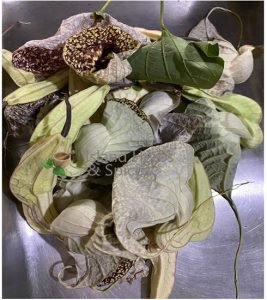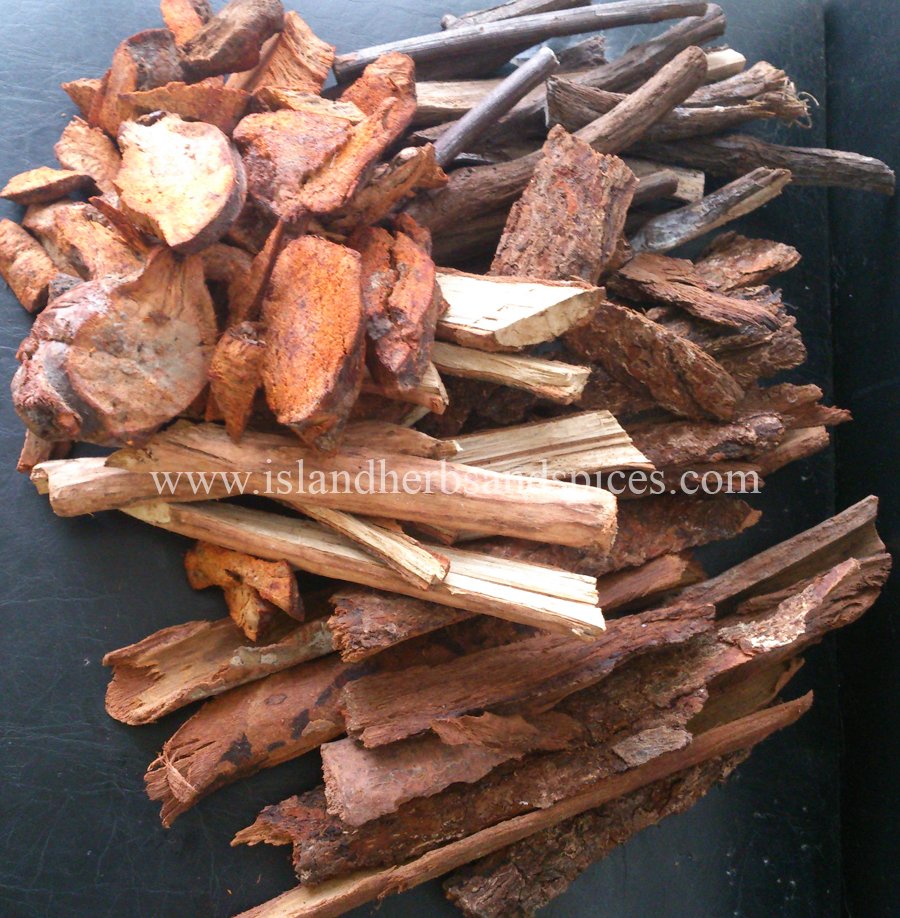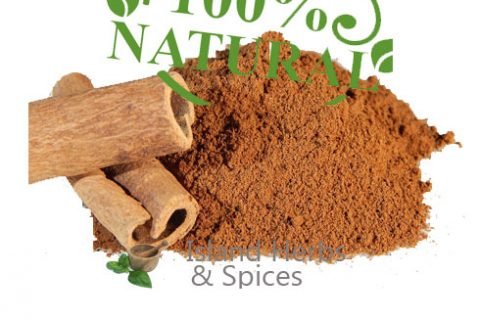Duck Flower, King of the Forest, Senna, Devil’s Horsewhip
DUCK FLOWER
There are several Jamaican herbs that are used to detoxify the body, a process sometimes referred to as a washout.
One such herb is the Duck Flower (Aristolochia grandiflora) which is also used for its several other benefits such as restoring mental clarity, regulating  heartbeat, enhance metabolism, clearing the body of excess mucus, improving blood sugar level, and weight loss. It is also used as an antioxidant, analgesic, and anti-inflammatory substance.
heartbeat, enhance metabolism, clearing the body of excess mucus, improving blood sugar level, and weight loss. It is also used as an antioxidant, analgesic, and anti-inflammatory substance.
But the duck flower is best known as a detox agent that works aggressively and gives results within a day. Jamaicans use the roots, leaves, and stems of the duck flower.
Why is the duck flower such a favourite detox agent? It is because the duck flower contains iron, which helps remove inflammation from the body by getting rid of excess mucus, phlegm, or cold on the chest. Duck flower also contains some antibiotics properties that help to kill bacteria and parasites in the intestines.
The duck flower detox is also quite effective for women who have irregular menstrual cycles, and contains an analgesic that reduces menstrual pain.
How to use the duck flower
The duck flower as a detox is said to be most effective when taken in a supplement form, that is powdered form, as a capsule, blended, or diluted.
KING OF THE FOREST
King of the Forest (Cassia alata) also known as Candle Bush, Impetigo Bush, Ringworm Cassia, Christmas Candle, among other names, is another Jamaican herb used to detoxify, or as a washout for the body. Traditionally, leaves of the King of the Forest herb is boiled to make tea which is consumed for these purposes.
Clinical trials in Thailand of the leaf of King of the Forest showed that it is an effective laxative. However, its use goes much further than just detoxification. The tea can be used to treat various skin conditions such as impetigo, ringworm, liver spots, fungal infections, acne, burns and ringworm.
Treating ringworm is done by pounding fresh King of the Forest leaves with water, garlic, red chalk and balm and applied to the skin that is infected with ringworm.
King of the Forest is also used to treat hypertension, fevers, stomach problems, and asthma, and is known to have antibacterial, antimicrobial, antifungal, analgesic, and anti-inflammatory properties. Studies in Jamaica also indicate that King of the Forest could also be effective in reducing blood pressure.
Recommended Use
Use a handful of fresh King of the Forest leaves, pound with one cup of water and boil for five minutes. Allow to steep, then drink.
SENNA
Another Jamaican herb used to detox, or washout is Senna (Senna alexandrina Mill). Senna is permitted by the US FDA as a nonprescription laxative. The plant is said to contain natural laxative substances and serves as a major remedy for constipation.
As a weight loss substance, Senna helps to remove toxins from the human body and aids the weight loss process. The concentration of toxins in the human body aids in weight gain. Toxin elimination can help in thwarting obesity and ultimately in reducing obesity.
Consuming senna herb or drinking tea made from the leaf encourages bowel movements within six to 12 hours after it is ingested. Senna is said to be quite effective as it is made up of a wide range of bioactive components such as antioxidants, vitamins, minerals, and laxatives, that serve to enhance immunity to several medical conditions
There are several other uses for Senna. It is also good to treat hemorrhoids and skin infections. A paste made of senna leaves is effective in curing skin infections such as acne, and inflammatory disorders, such as eczema.
In several countries, senna is an ingredient in several medicines that are on the market, such as Swedish bitters, Black draught, Daffy’s Elixir and several others including some diet teas.
DEVIL’S HORSEWHIP
Another Jamaican herb that is used for washout or detox is Devil’s Horsewhip (Achyranthes aspera), which is also known in some countries as burweed, rough chaff flower, and prickly chaff flower.
Despite its less than flattering name, devil’s horsewhip herb has many uses as the plant is known to possess astringent, digestive, diuretic, laxative, purgative and stomachic properties.
It is widely used to detoxify the body, to relieve nausea, to treat asthma, among other uses. These include dropsy, piles, boils and colic in children, and also as a cure for cough.
Devil’s horsewhip is used in several countries across the world. In Australia it is used in folk medicine, with the root being used as a diuretic, antispasmodic, emetic, for a range of ailments, such as boils, and dysentery. In India it is used for dropsy. It is also used to treat cholera, rabies, some skin diseases, and rheumatism.
Different sections of the devil’s horsewhip plant have specific uses. The seeds are used in cases of hydrophobia, ophthalmia, and for snake bites; the flowering spikes (the bur) mixed with sugar and made into pills are ingested by people bitten by mad dogs; the leaves, when taken fresh and squeezed into a pulp, is a good external remedy to treat scorpion bites; the root is used as a diuretic in veterinary medicine, juice made from the plant is used to treat hemorrhoids, itches, and rheumatic pains.
In some countries devil’s horsewhip is also consumed as vegetable on its own, as a substitute for spinach, or mixed with other vegetables.









